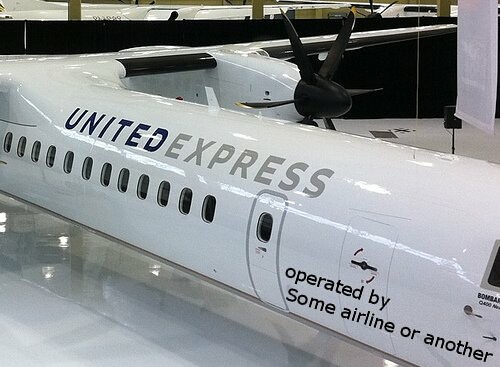Another day, another bankruptcy. On Sunday night, Pinnacle Airlines Corp filed for Chapter 11 bankruptcy protection to the surprise of nobody. I should say, to the surprise of nobody who has ever heard of the airline.
You probably haven’t heard of Pinnacle because it and its subsidiary airlines fly under the Delta Connection, United Express, and US Airways Express names. The group carried nearly 20 million passengers last year, so this should be a big deal. But it’s not if you’re a passenger. Let me explain why that’s the case.
Pinnacle Airlines itself was originally called Express Airlines I. It proudly carried the red tail as Northwest Airlink for many years (and Republic Express before that). A name change came a few years ago and it tried to expand. After getting Delta to give it some flying, Delta and Northwest merged bringing the airline back to square one with a single partner.
In recent years, Pinnacle expanded through merging. It acquired Mesaba from Northwest and it acquired Colgan Air. You may know the Colgan name. That’s because Colgan operated the Q400 that crashed in Buffalo a couple years ago. It’s no surprise that Pinnacle planned to phase out the Colgan name in favor of Mesaba, but it never quite got there. So now, bankruptcy is going to accelerate some big changes.
One of Pinnacle’s big problems is that it agreed to a lot of unprofitable contracts to fly express operations for major carriers in its effort to break into new flying opportunities. That wasn’t the smartest plan, but now those are all going to end.
Colgan built up a small Saab 340 turboprop operation for US Airways at LaGuardia, but with US Airways shrinking that operation thanks to the Delta slot swap, there was no need for Colgan anymore. The remaining few flights will be done soon. That has very little impact on travelers since it wasn’t going to last much longer anyway.
Perhaps more surprising is Colgan’s decision to end operations as United Express. Some of that was on Saab 340s but the real shock was the decision to stop flying its thirty Q400s as well. The Q400s had found a nice niche in the northeast as Continental Connection, but apparently the contract simply wasn’t producing for Colgan. It’s walking away completely with all flights under the United name stopped by the end of November.
Now that does seem like something that should concern you as a traveler, but it really shouldn’t. It’s not like these routes are going to disappear just because Colgan walks away. I asked United for a statement and was told this:
We are working with Colgan to transition their flying for United Express to other carriers, and are working hard to accommodate our customers. We have contingency plans in place and will contact any customer whose reservation may change as a result of the transition.In other words, while there could be some disruption, United will just find someone else to take over Colgan’s flying. Maybe United will turn to Horizon Air, a very experienced Q400 operator. Or maybe Republic will pick up the flying since it has been flying those airplanes for Frontier. Or maybe United will just transition to jets. The point is, United can fill the hole and you won’t ever know the difference. That’s one reason airlines like outsourcing. They can always replace an operator if things don’t work out.
Pinnacle will also be reducing its Delta flying a little, but not much. A handful of CRJ-900s will disappear since they fly under yet another unprofitable contract. But Delta is now the sole reason for Pinnacle to exist.
In fact, Delta is forgiving $44.3 million in debt as well as pumping in another $30 million to keep the airline flying while it restructures. If Delta didn’t pump money in, then Pinnacle might not have been able to arrange financing at all and could have been gone by June.
In return for this infusion, Pinnacle agreed to modify its “most valuable contract” operation 50 seat CRJs with Delta to be more favorable. As part of this, it got an extension to allow it to fly all 140 of those airplanes until the next decade.
So what does all this mean? It means flights will continue to fly. United will have to find someone else to do the flying while Delta will just get much of its flying for less . . . if you don’t count the $70+ million it’s investing in this deal.
If anything, this could be a good thing for passengers. Why do I say that? Well, Delta is getting a better deal on the CRJs because of this. That means some marginal small city routes might now look better with lower costs applied.
But beyond that potential benefit, there really isn’t much here that concerns the traveler. It’s just yet another bankruptcy.
[Original photo via Flickr user DearEdward/CC 2.0]


No comments:
Post a Comment